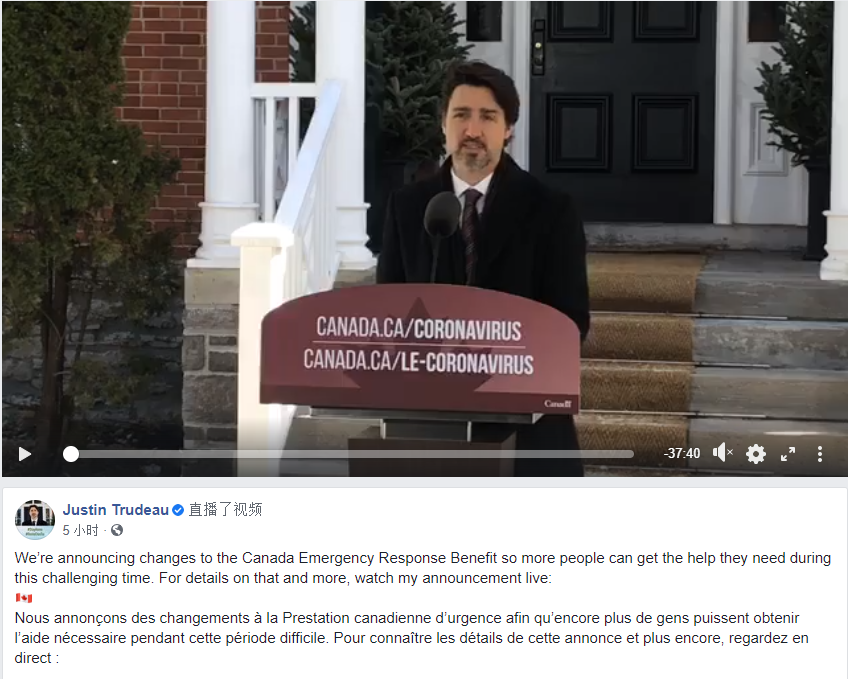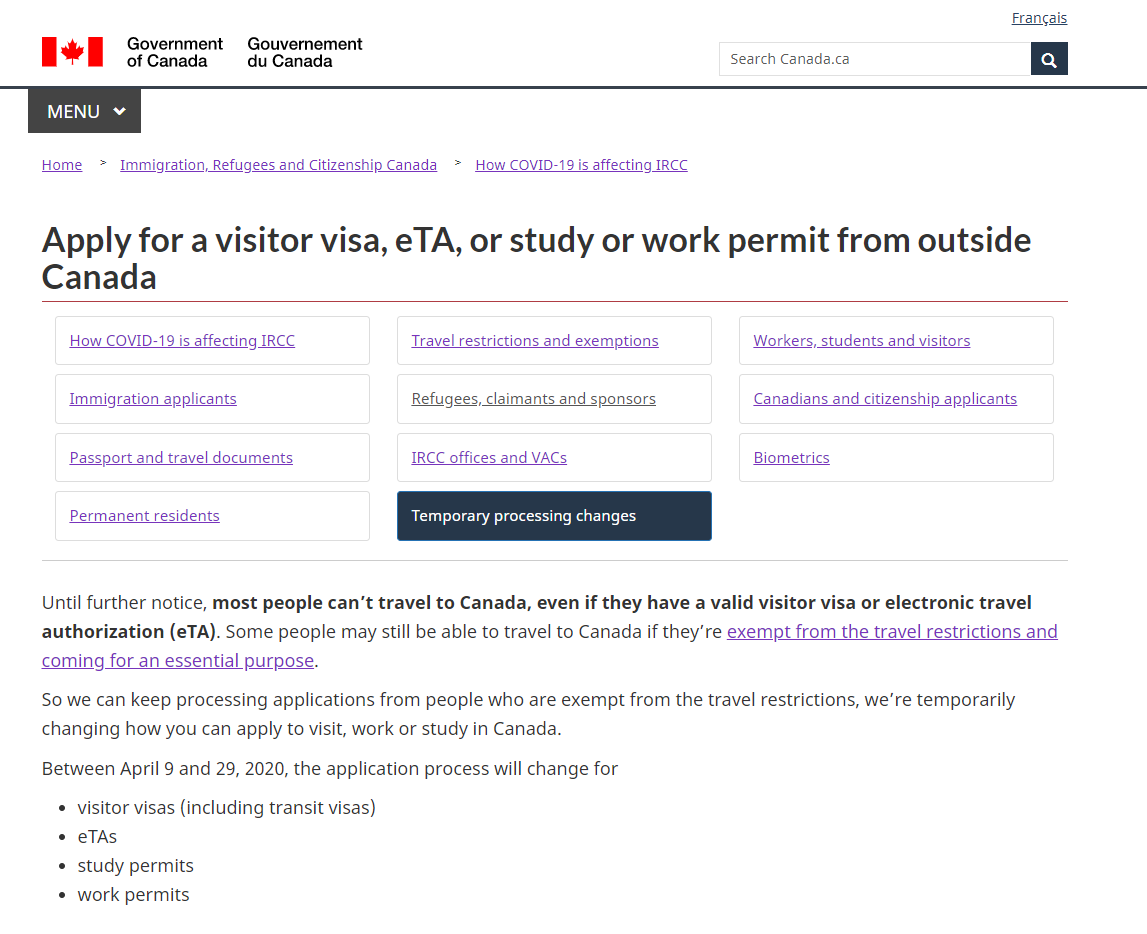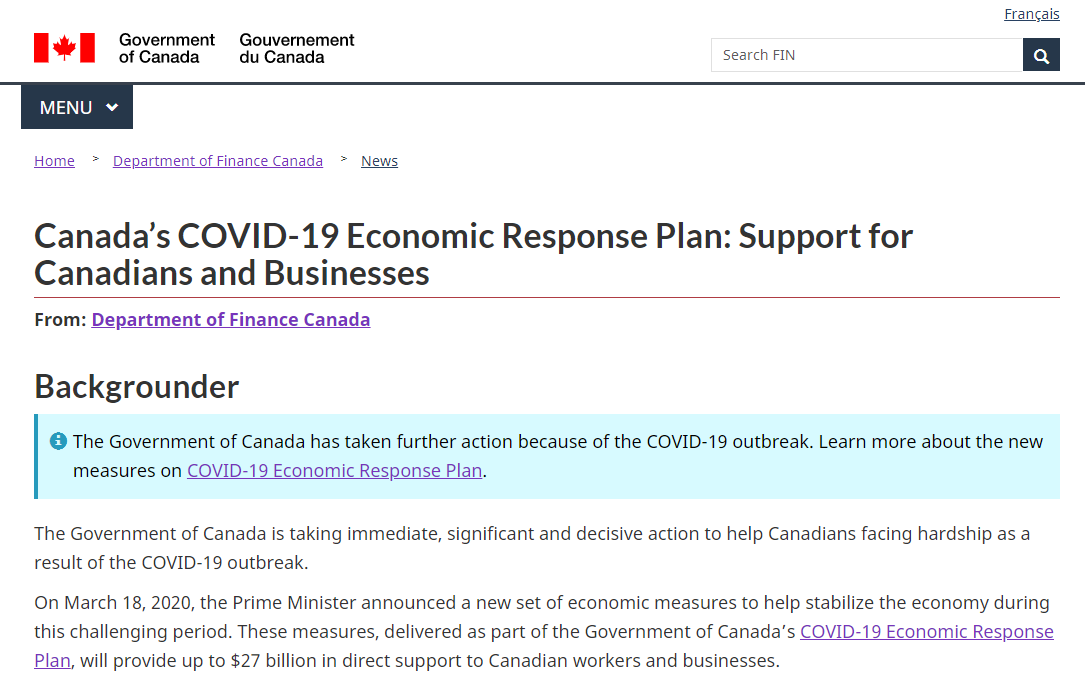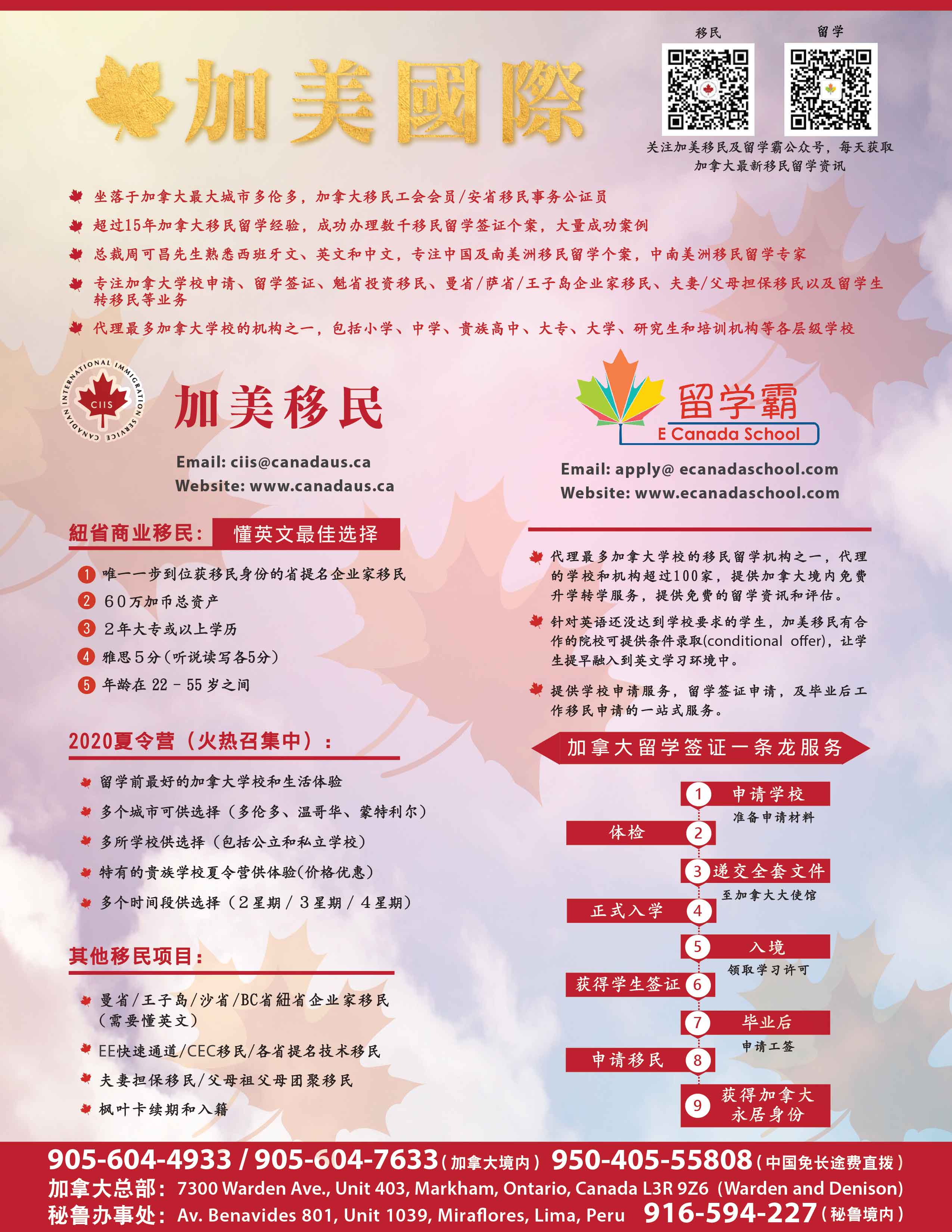Scan


COVID-19 is raging all over the world. In the face of the outbreak and community spread, the Canadian government has implemented a series of measures, including the introduction of multiple economic bailout emergency plans and response measures, hoping to help Canada's domestic life and work due to the outbreak People of all walks of life also reflect that Canada is based on humanistic care.

Measures for temporary residents who are temporarily unable to leave Canada
If you are a temporary resident of Canada but cannot leave Canada, you can refer to the following regulations of the Canadian Immigration Bureau IRCC:
If you are a tourist visa holder, you can submit an extension application online
If you are a student or work permit holder, you can apply for an extension. You must meet the renewal requirements for a study permit and work permit; if you are no longer studying or working, you can apply to change your status to a visitor status, as long as your Study visa or work visa has not expired
If your visitor record (visitor record), study or work permit has expired, and it is less than 90 days before your identity expires; you can apply for restoration of your identity.
If your visitor record, study or work permit has been more than 90 days, you may apply for a temporary resident permit, you must explain the reason for your stay in Canada when submitting the application.

To allow international students to continue their studies and change to online courses can still apply for a post-graduation work permit
The Canadian government announced that if it is still in isolation or unable to attend classes at the start of the school, students can take classes online. This will not affect students applying for a work permit (PGWP) after graduation.
International students can start classes online in May and June
Affected by the epidemic, many international students cannot go to Canada to study as scheduled. The Canadian Immigration Agency (IRCC) released a message that if applicants will start classes in May and June this year but cannot return to Canada, they can go online in their own country and complete no more than 50% of the courses online. The new rules also apply to students who get their school visa for the first time and will start classes in May or June.
Raise the wages of necessary workers who are still working in the epidemic
Prime Minister Trudeau announced an increase in the wages of essential workers. COVID-19 creates a great demand for low-income workers in certain sectors, including those in the front lines of hospitals and nursing homes, workers who ensure food supplies or provide basic retail services for Canadians. The Canadian government will work with provinces and territories through a new transfer payment method to apportion the wages of these low-income (monthly income less than C $ 2500) workers in the provinces and territories.
Provide psychological counseling services for children and adolescents
Due to school suspensions, the demand for consulting services for the Kids Help Phone (Kids Help Phone) is increasing 24 hours a day, seven days a week across Canada. In view of this, the government will provide Kids Help Phone with 7.5 million Canadian dollars to provide young people with the mental health counseling they need. Kids Help Phone is a community service for children and teenagers, providing professional consultation, information and referrals to young people across the country in English and French.
Benefits for children
Provide an additional $ 300 for each child through Canada Child Benefit in 2019-20. For the average family, this means about $ 550 more. This benefit will be provided as part of the CCB payment planned for May.
Tax credits for special goods and services for low-income and middle-income families
From April 9, the government will provide a one-off special payment for low- and middle-income families through the Goods and Services Tax Credit (Goods and Services Tax). The average additional income for singles will be close to $ 400, and the average additional income for couples will be close to $ 600.
Funding for vulnerable groups
The Canadian government donates $ 9 million to local organizations through United Way Canada to support practical services for the elderly. These services may include delivery of groceries, medicines or other required items, or personal outreach activities. United Way Canada is a charitable organization dedicated to improving people's lives and building strong communities across Canada. They provide services to vulnerable groups such as the elderly, the disabled, and homeless Canadians. The Canadian government also provides up to $ 50 million in funding to female shelters and sexual assault centers (including facilities in indigenous communities) to help them face or prevent outbreaks.
Support Fund for Indigenous Peoples
The Canadian government allocated 305 million Canadian dollars to establish a new difference-based indigenous community support fund to address the urgent needs of the indigenous, Inuit, and Metis communities. The funding will also provide support to indigenous organizations in regions, cities, and reserves.
Provide mortgage payment extension for homeowners
For homeowners facing financial pressure, the Canadian government says they are eligible to receive a Mortgage Payment Deferral for up to 6 months to help ease the financial burden. The COVID-19 mortgage payment extension plan will continue. You can apply at any time during the outbreak.
Provide loan repayment deferral for students
From March 30, 2020, all student loan repayment deferral borrowers will automatically suspend repayment until September 30, 2020. During this period, the borrower does not need to repay and no interest will be incurred.
Provide emergency assistance to workers who have lost their income
The Canadian government launched the Canada Emergency Response Benefit (CERB) to give workers who lost their monthly income due to COVID-19 $ 2,000 every four weeks for up to four months. Workers who extend this benefit to under $ 1,000 can also receive it.
Eligibility for Canadian Emergency Assistance Fund (CERB):
• Live in Canada and be over 15 years old
• Stop working due to COVID-19 or be eligible for EI periodic or sickness allowance
• No voluntary resignation
• People who are $ 1,000 or less per month
• Seasonal workers who are exhausted from regular EI contributions but unable to perform regular seasonal work due to COVID-19
• Workers who are unable to find a job or return to work because of exhaustion of EI regular contributions and because of COVID-19
CERB covers Canadians who have lost their jobs, become ill, segregate or care for people with COVID-19, and working parents who must take care of children who are sick or at home. CERB also applies to workers and people who are not eligible for employment insurance (EI) due to COVID-19. In addition, workers who are still working but have not received income due to work interruption due to COVID-19 are also eligible for CERB assistance.

Provide interest-free loans for enterprises
The newly established Canada Emergency Business Account will fund eligible financial institutions so that they can provide interest-free loans of up to CAD 40,000 to businesses with credit lines of less than CAD 1 million. The loan is guaranteed by the federal government, and if the business meets certain conditions, it can be exempted from Canadian $ 10,000.
Guaranteed loans for SMEs
The Canadian Government ’s new Small and Medium-sized Enterprise Loan and Guarantee program will operate in the following manner: Export Development Canada will provide guarantees for financial institutions so that they can provide small and medium-sized enterprises The company has issued up to $ 6.25 million in new operating credit and cash flow term loans. These loans will be guaranteed by Canada Export Development Agency 80%.
Provide temporary wage subsidies to employers
The Canadian government allows qualified employers (non-profit organizations, charities, and certain Canadian-controlled private companies) that pay employees (such as salary, wages, or taxable benefits) before or after March 18 to June 20 Reduce the taxes paid to CRA through the amount of subsidies.
The Wage Subsidy Program is equal to 75% of the remuneration paid by qualified employers between March 18, 2020 and June 20, 2020. In other words, each employee receives up to $ 847 in subsidies per week and up to $ 366 per month in subsidies.
Provides flexibility for taxpayers
The Canadian government limits the payment deadline for taxpayers. The deadline for submitting the income tax and benefit return will be postponed to June 1, 2020.
The deadline for paying any payables for personal income tax and benefit returns for 2019 has been extended from April 30, 2020 to September 1, 2020.
For self-employed persons or spouses or common-law partners with self-employed persons, the deadline for paying any personal income tax and benefit returns has also been extended from April 30, 2020 to September 1, 2020
The deadline for companies to pay any income tax payable after March 18, 2020 and before September 1, 2020 has been extended to September 1, 2020.
Donate materials to countries in need
Since February 4, 2020, Canada has provided China with 16 tons of emergency aid materials including masks, goggles, medical gloves and medical protective clothing, hoping to help China fight the pneumonia epidemic caused by the new coronavirus.
Implement limited closure
The Canadian government has not comprehensively banned foreigners from entering the country. On March 16, a limited number of countries were closed. Those who can still enter include:
-Canadian citizens
-Permanent residents of Canada
-Immediate family members of Canadian citizens
- diplomatic person
- citizen of U.S
-Crew
The following persons may also enter Canada for necessary reasons:
• Temporary foreign workers
• International students currently holding a valid student visa or the student visa approved before March 18, 2020
• Eligible permanent residents
• Immediate family members of Canadian citizens or permanent residents of Canada
• Immediate family members authorized in writing by the Canadian government to reunite transit passengers with non-Canadian citizens or permanent residents residing in Canada (must remain at a Canadian airport to complete the transfer)
• Canadian troops, visiting troops, members of the Department of Defense and their immediate family members
• Accredited diplomats and immediate family members (including North Atlantic Treaty Organization, personnel under the United Nations Headquarters Agreement, other organizations)
• Air or sea crew
• French citizens living in Saint-Pierre-et-Miquelon as long as they have been in Canada, the United States or Saint-Pierre and Miquelon in the past 14 days
• Anyone who believes that Canada ’s Chief Public Health Officer will not cause significant damage to public health and will provide essential services while in Canada
• The Minister of Immigration, Refugee and Citizenship believes that anyone in Canada is in the national interest; public safety and emergency preparedness; or diplomacy
• Anyone who came to provide COVID-19 assistance at the invitation of the Minister of Health
• Anyone who provides medical assistance
Immediate family members are defined as:
• Spouse or common-law partner
• dependent children
• dependent children of dependent children
• Parents or step-parents
• Guardian

